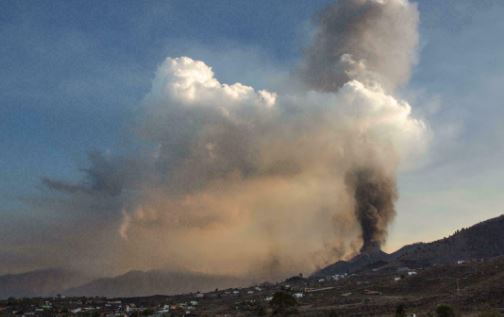
MADRID, Sept 25 (NNN-AGENCIES) — Clouds of thick black ash from volcanic eruptions in Spain’s Canaries archipelago forced the closure of the airport on La Palma island on Saturday, authorities said.
The Cumbre Vieja volcano came to life a week ago and has intermittently spewed out lava and ash leading to the cancellation of all seven flights on Friday.
“The airport is closed because of the accumulation of ash,” said state-owned airport operator Aena.
“Clean-up operations have begun but the situation can change at any moment,” it added.
More evacuations were also ordered Friday at the town of El Paso as large explosions and new openings were reported at the volcano.
“Given the increased risk for the population due to the current eruptive episode”, the regional government said, an obligatory evacuation order was issued for several districts.
That pushed the number of people forced to leave their homes so far to more than 6,200, including 400 tourists.
The flight cancellations began on Friday.
“It is not yet possible to say when we can resume flights,” Spanish carrier Binter said on Twitter.
According to the European Union’s Copernicus Earth Observation Programme, lava has so far destroyed 420 buildings and covered more than 190 hectares of land.
Prime Minister Pedro Sanchez announced La Palma would be declared “a zone affected by a catastrophe” which opens financial aid to residents.
The speed of the lava flowing from the crater has steadily slowed in recent days, and experts hope it will not reach the coast.
If the molten lava pours into the sea, it can generate clouds of toxic gas into the air, also affecting the marine environment.
No casualties have been reported so far but the damage to land and property has been enormous, with the Canaries regional head Angel Victor Torres estimating the cost at well over 400 million euros ($470 million).
The eruption on La Palma, home to 85,000 people, was the first in 50 years.
The last eruption on the island came in 1971 when another part of the same volcanic range — a vent known as Teneguia — erupted on the southern side of the island.
Two decades earlier, the Nambroque vent erupted in 1949. — NNN-AGENCIES




